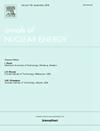小型铅冷堆无保护电站停电时不同TRU组成对系统响应的影响
IF 2.3
3区 工程技术
Q1 NUCLEAR SCIENCE & TECHNOLOGY
引用次数: 0
摘要
用两种不同的锕系元素作为燃料:一种来自乏轻水反应堆(LWR)燃料,另一种来自小型轻水反应堆(LFR)排放的UN燃料,对一个小型铅冷却反应堆的无保护站停电(USBO)的动态响应进行了评估。我们证明了延迟中子分数的减少,主要是由于加入了镅,导致USBO第一阶段的峰值温度降低。尽管在242Cm衰变过程中由于氦的产生而增加了内部气体压力,但这种减少有助于确保包层的完整性。还表明,必须增加冷却剂体积,以缓冲衰减热,直到容器空气冷却有效,以确保燃料包壳的完整性。我们的结论是,(U,Pu)N燃料的241Pu含量可以忽略不计,在USBO过程中提供了最好的性能来确保包层的完整性。本文章由计算机程序翻译,如有差异,请以英文原文为准。
Impact of different TRU compositions on system response during an unprotected station blackout in small lead-cooled reactors
The dynamic response to an Unprotected Station Blackout (USBO) has been evaluated for a small, lead-cooled reactor when fuelled with two different actinide compositions: one sourced from spent light water reactor (LWR) fuel and the other from UN fuel discharged from a small LFR. We demonstrate that a reduction in the delayed neutron fraction, primarily due to the addition of americium, leads to lower peak temperatures during phase one of the USBO. This reduction could help with ensuring cladding integrity despite an increased internal gas pressure resulting from helium production during the decay of 242Cm. It is also shown that the coolant volume required to buffer decay heat until vessel air cooling becomes effective must be increased to ensure the integrity of the fuel cladding. We conclude by demonstrating that (U,Pu)N fuel, with negligible 241Pu content, offers the best properties to ensure cladding integrity during the USBO.
求助全文
通过发布文献求助,成功后即可免费获取论文全文。
去求助
来源期刊

Annals of Nuclear Energy
工程技术-核科学技术
CiteScore
4.30
自引率
21.10%
发文量
632
审稿时长
7.3 months
期刊介绍:
Annals of Nuclear Energy provides an international medium for the communication of original research, ideas and developments in all areas of the field of nuclear energy science and technology. Its scope embraces nuclear fuel reserves, fuel cycles and cost, materials, processing, system and component technology (fission only), design and optimization, direct conversion of nuclear energy sources, environmental control, reactor physics, heat transfer and fluid dynamics, structural analysis, fuel management, future developments, nuclear fuel and safety, nuclear aerosol, neutron physics, computer technology (both software and hardware), risk assessment, radioactive waste disposal and reactor thermal hydraulics. Papers submitted to Annals need to demonstrate a clear link to nuclear power generation/nuclear engineering. Papers which deal with pure nuclear physics, pure health physics, imaging, or attenuation and shielding properties of concretes and various geological materials are not within the scope of the journal. Also, papers that deal with policy or economics are not within the scope of the journal.
 求助内容:
求助内容: 应助结果提醒方式:
应助结果提醒方式:


